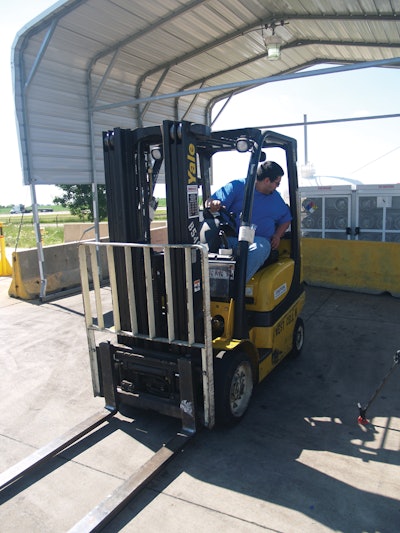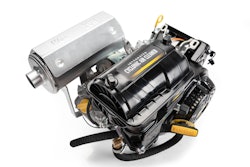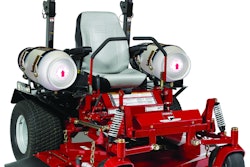
Propane-fueled engine technologies allow manufacturers of off-road equipment like commercial lawn mowers and forklifts to offer high-performance products that provide sustainability and economic advantages for their customers.
For example, lawn and landscape contractors may save money by using propane-fueled mowers because of reduced maintenance and downtime through approved operation on ozone action days. They are safer to use during pollution advisory periods than gasoline-fueled mowers because they emit significantly fewer ground-level ozone precursors and particulate matter, the pollutants considered most harmful to human health. And propane-fueled mowers reduce greenhouse gas emissions by nearly 50% compared with gasoline-fueled mowers and can reduce carbon monoxide emissions by more than 80%.
Propane-fueled forklifts provide similar advantages to owners and operators of warehouses, distribution centers, and factories. They reduce greenhouse gas emissions by 19% compared with gasoline-fueled forklifts and 7% compared with diesel-fueled forklifts. They maintain consistent, 100% power throughout operation and offer faster ground speeds than electric forklifts.
Because of the advantages propane-fueled technologies can offer these markets, the growth of propane-fueled mower and forklift engines has been a key focus area for the Propane Education & Research Council (PERC). PERC promotes the safe and efficient use of odorized propane gas through wide-ranging programs that support research and development, safety, training, and commercialization of promising propane technologies. That includes funding grant requests for innovative projects in those areas. PERC has awarded more than $81.3 million for research and development of groundbreaking propane technologies through dozens of partnerships with top manufacturers, universities, and national laboratories.
Fuel availability, easy refueling crucial
While PERC has placed strong emphasis on development and commercialization of propane-fueled off-road engine technologies, fuel availability and ease of refueling is important to technology users.
Propane is an approved clean alternative fuel under the Clean Air Act of 1990, and a qualifying alternative fuel eligible for various federal tax incentives and programs. Nearly 90% of U.S. propane supplies are produced in the United States, and with up to 56,000 miles of pipeline, propane is an abundant, readily available, domestic fuel for off-road engine applications.
The propane industry’s established fuel delivery and propane cylinder exchange structure has made refueling simple for operators of propane-fueled mowers and forklifts. Cylinder exchange programs usually include installation of a cage where a propane provider replaces empty cylinders with full ones during regularly scheduled deliveries. Propane cylinders require little space and can easily be kept in a storage area at a facility. This approach conserves time and resources, and allows trained operators to refuel as often as needed. For customers requiring large quantities, a propane provider can install a no-spill dispenser on site to refuel empty cylinders.
Propane-fueled mowers, forklifts
Ease of refueling has complemented the increasing availability of propane-fueled mowers in recent years, and the anticipated growth of propane-fueled technologies in the lawn and landscape industry. More than 30 models are available from industry-leading brands, including Cub Cadet, Dixie Chopper, Exmark, Ferris Industries, Gravely, Husqvarna, Scag Power Equipment, Schiller Grounds Care/Bob-Cat, and Zipper. These mowers meet or exceed all current Environmental Protection Agency and California Air Resources Board standards.
To better understand contractors’ use of propane-fueled mowers, refueling options, and future need areas, PERC sponsored a research study in 2011 to learn how to better serve the lawn and landscape industry through products and safety and training initiatives. Among the study’s findings:
- One-fourth of respondents are either extremely or very interested in propane fuel for mowing equipment.
- Propane-fueled mower users cite the marketing advantages of promoting environmental sustainability, along with cost savings, as motivating factors underlying their conversion.
- Propane is thought to be available where 86% of commercial mowers are located.
The propane industry’s established refueling structure has been used for decades in U.S. warehouses, distribution centers, and factories using propane-fueled forklifts. Today, more than 600,000 propane-fueled forklifts are in use in the United States. They provide consistent power throughout operation and can run 24 hours a day, with longer run times between refueling than electric alternatives and much shorter refueling times than electric and compressed natural gas alternatives.
Anticipated growth
PERC’s research and development goal is to develop effective programs that expand markets, reduce costs, enhance safety, and improve the environmental performance of propane products, including off-road engine technologies. PERC works with manufacturers, researchers, and government partners to strengthen technical knowledge, leverage funding, and maximize investments in developing new propane products. The collaboration ensures that innovative applications of propane are realized in the most effective way possible.
PERC anticipates growth in propane-fueled off-road engine technologies for many reasons, including the success of its research and development, safety, training, and commercialization programs. That includes Propane Challenge, PERC’s open innovation initiative that aims to generate ideas and solutions using propane-fueled technology. PERC is encouraging the best minds in research and development to submit breakthrough ideas for funding opportunities. For more information, visit www.propanechallenge.com.
For more information on collaborating with PERC, visit www.propanecouncil.org. For more information on propane-fueled off-road engine technologies, visit www.poweredbypropane.org.
The Propane Education & Research Council was authorized by the U.S. Congress with the passage of Public Law 104-284, the Propane Education and Research Act (PERA), signed into law on October 11, 1996. The mission of the Propane Education & Research Council is to promote the safe, efficient use of odorized propane gas as a preferred energy source through research and development, training, and safety initiatives.



















